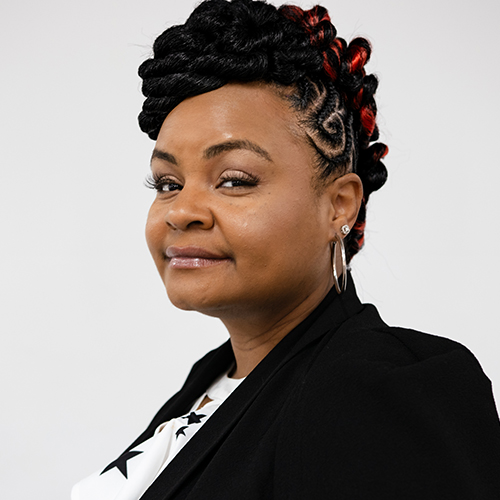‘Yes, Chef!’: Unlikely Duo Finds Commonality in the Kitchen
SHRM24 speakers’ recipe for inclusion mixes vulnerability and compassion

At first glance, Ed Frauenheim and Sha’Kiera Randolph could not be more different: a white man from an economically advantaged family in New York state, and a Black woman who grew up poor in inner-city Detroit. He’s a Princeton University graduate and the author of multiple books, while she’s a training and development specialist who worked her way up from a waitressing job to a career as a public speaker.

But when they presented a concurrent session together on June 24 at the SHRM Annual Conference & Expo 2024 (SHRM24), the self-proclaimed “diverse duo” donned matching blue chef coats—in honor of their shared love for the FX on Hulu show “The Bear,” set in Chicago not far from the site of SHRM24—and color-coordinated high-top sneakers.
And as they relayed the story of their unexpected friendship, the common values that drew them together became more apparent.
“We found our journey to be a great adventure of discovery as well as connection,” said Randolph, founder and CEO of Sha’Kiera Star and Associates.
She met Frauenheim—or “Chef,” as they frequently call each other, in another nod to “The Bear”—while out to lunch with her mentor about a year ago. She was initially wary and wanted to preserve her valuable time with her trusted advisor.
However, Randolph soon learned that despite their surface-level differences, she and Frauenheim have many things in common too. These include their love of R&B, especially Sade, which was also reflected in the presentation, but also the fact that they both had overcome despair to reach this point in their respective careers.
“Men are supposed to dominate, to win, but I kept coming up short, even choking in key moments,” Frauenheim said.
For many years, he said, he felt inadequate as a man. He suffered a heart attack and experienced panic attacks and suicidal ideation. As he recovered, he learned how to unpack the toxic elements of what he called the “hypermasculine rat race.” (He’s now the co-founder of the Teal Team advisory firm.)

Randolph had anguish in her past as well. Her father spent many years in prison, and several of her family members died at young ages. As a Black woman, she was subjected to racist language and harassment in the workplace and also experienced exclusion.
“Inequities are commonplace, and so are feelings of disengagement or lack of inclusion,” Randolph said.
Frauenheim agreed. “The rat race as we’ve known it sets most of us up to lose or to fail, and it often diminishes our souls rather than nourishes them,” he said.
The two became pen pals, then met up in person to truly walk around in each other’s lives. Together in Frauenheim’s kitchen, they cooked a stew of beef, potatoes, carrots, and parsnips, with miso for some added flavor. They also developed a metaphorical “soulful stew of inclusion.” The dish’s six ingredients are patience, adventure, vulnerability, humility, compassion, and playfulness.
“There was something profound about us collaborating on this … rich dish that fed us on a deep level,” Frauenheim said. “We ingested these ingredients that build a solid foundation for connection across difference.”
“All of us are hungry for something more than that thin gruel that society and organizations tend to serve up today,” Randolph added. “A truly inclusive business is just like a stew, where all the great flavors, all the pieces of humanity, come together to make a flavorful dish. Diversity needs inclusion, even when we feast.”
Session attendees were invited to reflect on the role the six ingredients play in their own professional lives. Angela Jackson, senior HR consultant for the U.S. Office of the Comptroller of the Currency in Washington, D.C., said she wants to work on patience, which she can accomplish through her existing strength of compassion.
“We come to work and we just think about the work, but it’s equally important to think about the people we’re working with and think about how we can better empathize and serve them,” Jackson said. “Getting to understand others more so we can hone in on their strengths and understand where they’re coming from is key.”
Frauenheim and Randolph agreed that regardless of economic circumstance, true wealth comes in the relationships we build with others. They challenged the session’s attendees to meet someone new who is different from them, perhaps even while attending SHRM24, in order to discover the commonalities we all share and to further inclusion in the world.
Together in the kitchen, as they chopped vegetables and stirred stories of their personal and professional journeys, Randolph said, “We forged and bridged those social worlds together.”
An organization run by AI is not a futuristic concept. Such technology is already a part of many workplaces and will continue to shape the labor market and HR. Here's how employers and employees can successfully manage generative AI and other AI-powered systems.



